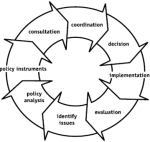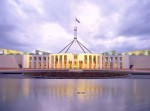Category Archives: Australian Government
New Federal Government
 After the change in Australian Liberal Party leaders on Friday 24 August 2018, new Liberal Party leader and new Prime Minister Scott Morrison announced his Ministry on Sunday 26 August.
After the change in Australian Liberal Party leaders on Friday 24 August 2018, new Liberal Party leader and new Prime Minister Scott Morrison announced his Ministry on Sunday 26 August.
Here is a downloadable PDF file of the new Ministry: http://bit.ly/2LBxBfs.
Wikipedia has a useful article about the leadership spill, here http://bit.ly/2BTWXFZ.
.
8 August 2017: Opportunity for Government, or for Litigation?
Australia is supposed to have seventy-six Senators: right now we have no more than seventy-four, possibly only seventy-two, and possibly far fewer, because of application of s44 of the Australian Constitution. And when Parliament resumes on 8 August, expect political and legal fireworks.
This reduced number of Senators is important, because it might make it easier for the Government to get their legislation passed.
Here’s why: while Australia’s Liberal National Party Coalition government has the support of a majority in the House of Representatives, no legislation can pass without the support of a majority in the Senate, where the Government is in a minority. This means all legislation which passes through the Senate, and subsequently becomes law, must garner support from non-government parties, and with fewer Senators the total number of Senators required to support legislation reduces.
If we indeed have 74 Senators,
- 29 are from the Coalition,
- 26 are from Labor,
- 7 from the Greens,
- 4 are from One Nation,
- 3 from the Xenophon Team, and
- one each are from the Liberal Democrats (Leynholm), Justice Party (Hinch), Australian Conservatives (Bernardi), Jacqui Lambie Network, and independent Gichuhi (who is ex-Family First).
With only seventy-four Senate votes in play, to secure Senate passage of government legislation, the Liberal National Party Government needs nine votes from amongst the 19 cross-benchers; Labor needs 12 to block the passage of any legislation, or pass their own resolutions.
The Government now needs the support of one less non-Government Senator than before, to see legislation passed, and this situation will continue for months as the process of replacing ineligible Senators isn’t quick – see https://ethicalconsultingservices.wordpress.com/2017/07/17/ludlam-senate/. This presents the Government with opportunities to advance unpopular legislation through the Senate – the two ineligible “Senators” are seen as more likely to have opposed components of the Government’s legislative program.
We are down to no more than seventy-four Senators because two Greens Party Senators have acknowledged they are ineligible – see www.couriermail.com.au/news/queensland/queensland-government/queensland-greens-senator-larissa-waters-resigns-over-dual-citizenship/news-story/ecb99e946835145fd8f6dacdbf55e131. We may have only seventy-two Senators because detailed questions have been raised about the eligibility of two others – see www.brisbanetimes.com.au/federal-politics/political-news/malcolm-roberts-expert-anne-twomey-believes-one-nation-senator-may-have-breached-constitution-20170727-gxkeol.html and www.brisbanetimes.com.au/federal-politics/political-news/the-dissenting-argument-from-a-former-governorgeneral-that-could-save-matt-canavans-skin-20170727-gxjxkr.html.
Both Senators Roberts (One Nation Party) and Canavan (Liberal National Party) say they are eligible. There’s no doubt this will be tested in the Court of Disputed Returns – probably at the same time as determinations are made about Larissa Waters’ and Scott Ludlum’s replacements.
The Australian Senate resumes on 8 August 2017, and we can be very sure if either Senator Roberts or Senator Canavan seek to exercise a vote, or perhaps even take their seat, someone is going to go to Court, claim those Senators are ineligible, and seek via legal action to stop them acting as a Senator.
And to add to the potential for chaos, while it is a typically over-blown and under-researched article, the Australian newspaper has questioned the eligibility of 21 Members of Parliament further, from all of the Liberal Party, the National Party, and Australian Labor Party: www.theaustralian.com.au/national-affairs/mp-dual-nationality-fiasco-extends-to-bloodlines/news-story/5ad03ba3d47cf4eae0a5b1066ea5c59b?login=1 (paywalled).
In the House of Representatives, the Government has only a one-seat majority – should any one Government member* in the House acknowledge ineligibility, or be found ineligible, they will lose their working majority in the House, the capacity of the Government to govern at all becomes questionable, and we may be headed to a very early election.
By 8 August, all of our Parliamentary parties need to have their plans in place for how to react: because the success of the Government’s legislative program, or the very existence of the Turnbull Government, might hinge on the outcome, there’s little hope of bipartisanship.
Here’s a link to information on the Australian Electoral Commission website explaining eligibility laws: www.aec.gov.au/About_AEC/Publications/backgrounders/constitutional-disqual-intending-candidates.htm
* Or one more Government member than non-Government members.
Labor Prime Minister Ineligible?
Was Australia’s, and the world’s, first Labor Prime Minister invalidly elected?
Scott Ludlam’s and Larissa Waters’ announcements they are not eligible to be Senators www.theaustralian.com.au/national-affairs/greens-mp-scott-ludlam-forced-to-quit-senate/news-story/c92e91f84c9db4abc3d11e92eb96abf5 and www.couriermail.com.au/news/queensland/queensland-government/queensland-greens-senator-larissa-waters-resigns-over-dual-citizenship/news-story/ecb99e946835145fd8f6dacdbf55e131 throws plenty of juicy but well-answered questions into the public arena, but because they are so badly trained and do so little research, most journalists and commentators will get their facts wrong – see yesterday’s article here.
But there’s an even more interesting issue of which we are reminded: was Australia’s and the world’s first Labor Prime Minister invalidly so?
Chris Watson’s birthplace and birthdate were once the subject of some confusion, but it’s now clear he was born in Chile: http://adb.anu.edu.au/biography/watson-john-christian-chris-9003.
Did Chilean law at that time mandate that someone taking citizenship of another country automatically lost Chilean citizenship? If not, did he ever renounce his Chilean citizenship? Almost certainly not.
Was he ever an Australian citizen? The Grassby/Ordoñez biography* (pages 31-32) suggests he claimed to be British-born, and never bothered with the formality of becoming an Aussie.
So, how could he be elected to the Australian Parliament in 1901 and later become Australia’s** first Labor Prime Minister in 1904? Quite possibly not lawfully!
* Grassby, A. and Ordoñez, S. (1999) . John Watson. Melbourne: Black Inc.
** … and the world’s! Did we mention that already?
Scott Ludlam & the Australian Senate: what happens now?
Scott Ludlam’s announcement he’s not eligible to be a Senator www.theaustralian.com.au/national-affairs/greens-mp-scott-ludlam-forced-to-quit-senate/news-story/c92e91f84c9db4abc3d11e92eb96abf5 throws plenty of juicy but well-answered questions into the public arena, but because Australian journalists and commentators are too often badly trained and do little research, most will get their facts wrong.
Here’s some fast facts:
- Scott can’t resign from the office of Senator, because he’s not a Senator: his ineligibility means his election was invalid and he’s never lawfully been a Senator. You can’t resign from being something that you’ve never been.
- Declaration of the poll, on each of those occasions he’s been elected and reelected, by the Australian Electoral Commission doesn’t make him a Senator if he never was eligible; the AEC doesn’t have the power to inquire into eligibility – they simply require candidates to declare they are eligible.
- Because he can’t resign, someone – probably the AEC – will need to start a Court of Disputed Returns action in order to have Scott’s election declared invalid and a recount ordered.
- Or, he could try to take his seat in the Senate* at the next sittings, or re-occupy his Senate office, or take his next Senate pay cheque, in which case someone – probably the Liberal Party or National Party – would seek an injunction to prevent it, which would eventually have the same outcome as a Court of Disputed Returns action.
- Because Scott isn’t resigning, the casual vacancy mechanism relating to mid-term replacement of Senators isn’t activated and The Greens don’t get to nominate a replacement.
- The recount mentioned above will probably see the third candidate on The Greens’ Senate ticket at the last election – Jordon Steele-John – declared elected.
- In theory, Scott has a debt to the Commonwealth of all of the salary he has been paid, and all of the expenses of his office. Normal practice is that the debt is calculated, demanded, and then waived. However, others have different ideas: www.theguardian.com/australia-news/2017/jul/16/george-brandis-attacks-scott-ludlam-and-says-he-could-be-forced-to-repay-debt.
- This is a guy who has been doing what has generally been acknowledged to be a good job**, is hard-working, and is open about having suffered depression, and these revelations will have come as a huge shock; all of his staff, too, are now without jobs or income: so even those who dislike The Greens intensely might wind back the gloating a little.
The ABC’s Antony Green makes additional interesting points here http://blogs.abc.net.au/antonygreen/2017/07/scott-ludlam-resigns-what-happens-to-his-senate-seat.html.
The Senate may initially be harder to predict until a new Senator is appointed – probably months away – but things will be easier for the Government in the interim:
Of the 75 Senators post-Ludlam, 29 are Coalition, 26 Labor, 8 Greens, 4 One Nation, 3 Xenophon Team, and one each to Liberal Democrats (Leynholm), Justice Party (Hinch), Australian Conservatives (Bernardi), Jacqui Lambie Network, and independent Gichuhi (who is ex-Family First); usually, to secure Senate passage, the Government will need nine votes from amongst the 20 cross-benchers, and Labor needs 12. Prior to the Ludlam revelation, the Government needed ten and Labor needed thirteen.
Prior to the Ludlam revelation, the Government needed ten and Labor needed thirteen. The smaller number will make it easier than before, for the Government to stitch together nine further votes and hence a Senate majority, because they will have to wrangle fewer of the cross-bench votes, and complicated ideologies and personalities, so to do.
* Of course he won’t: he’s not that dishonest or stupid. Many friends say he is quite nice.
** Political disagreements aside, of course.
Last Week in Queensland – 6 February 2017
 Dreadful family violence stories and the new US President, marginalised other news in Queensland, but Pauline Hanson’s One Nation Party made plenty of news, as did impending changes at Queensland Rail.
Dreadful family violence stories and the new US President, marginalised other news in Queensland, but Pauline Hanson’s One Nation Party made plenty of news, as did impending changes at Queensland Rail.
Governing
- Premier rules out governing with One Nation Party www.couriermail.com.au/news/queensland/queensland-government/premier-annastacia-palaszczuk-rules-out-governing-deal-with-one-nation/news-story/c8e8fb0c4fc254151c01b084bd7e974a
- Major Queensland Rail changes anticipated this coming week http://au.news.yahoo.com/qld/a/34328504/qld-premier-to-meet-with-qr-probe-chief/#page1 and www.couriermail.com.au/news/queensland/queensland-government/queensland-rail-more-heads-to-roll-as-independent-review-concludes/news-story/ca52ae5ae59c5f20c0d7aeed28346978
- Government rules out expanding home-owner grant www.couriermail.com.au/news/queensland/first-homeowner-grant-treasuer-curtis-pitt-rules-out-extending-it/news-story/5b4572949a52f2bea394107dcd7ac93e
- Internal Government tension over discrimination appeal www.theguardian.com/australia-news/2017/feb/03/palaszczuk-government-faced-internal-revolt-over-palm-island-appeal
- Government-Owned Corporation dividends confirmed returning to region www.cqnews.com.au/news/revealed-64m-dividends-flow-back-gladstone/3138744/
- Domestic violence law reform under consideration www.couriermail.com.au/news/queensland/crime-and-justice/queensland-bail-review-could-see-onus-placed-on-accused/news-story/1a54a0dba362ccf3281460991596d53c and www.9news.com.au/national/2017/02/01/11/41/palaszczuk-considering-bail-overhaul
- … but see below under “Opposition and Crossbench”
- Vouchers for families to get kids into sport www.9news.com.au/national/2017/02/01/16/33/government-offers-150-vouchers-for-queensland-kids-to-get-into-sport
- Auditor notes health budget over-runs www.couriermail.com.au/news/queensland/queenslands-hospital-and-health-services-posts-46-million-deficit-in-past-financial-year/news-story/84fc91ff1a0f0dd0e2dc1757b6d78aa9
- Revised Information and Communication Technology strategy under development www.technologydecisions.com.au/content/gov-tech-review/news/queensland-to-launch-new-ict-strategy-717892027#axzz4Xo7eY5mu
Opposition and Crossbench
- Opposition steals Government’s thunder on bail reform www.abc.net.au/news/2017-02-05/domestic-violence-murder-victim-teresa-bradford-lnp-bail-laws/8242526 vs www.9news.com.au/national/2017/02/02/20/21/plans-underway-to-tighten-bail-laws-across-queensland-following-death-of-teresa-bradford
- One Nation Party’s policy proposals, with particular Queensland focus www.couriermail.com.au/news/queensland/hansons-blueprint-for-australia-under-one-nation/news-story/84b647417dec44e42ff580a22f622b4c
- John-Paul Langbroek to repay expenses claimed www.abc.net.au/news/2017-02-02/hookers-john-paul-langbroek-vows-to-repay-hotel-costs/8235924
- Opposition’s crime policies released in regional Queensland www.townsvillebulletin.com.au/news/opposition-leader-tim-nicholls-pledges-to-bring-back-tough-approach-to-young-criminals/news-story/38c208d0498462e66df2cf986a692706
- Opposition Leader won’t rule out a deal with One Nation Party www.couriermail.com.au/news/queensland/queensland-government/lnpone-nation-deal-not-off-the-table-but-labor-rules-it-out/news-story/96828fd450aecc56dbb2865e61944e61
Politics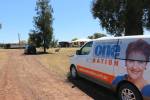
- One Nation Party surging in Central Queensland www.couriermail.com.au/news/queensland/queensland-government/labor-struggling-to-slow-one-nations-momentum-in-regional-queensland/news-story/0327b94af2aa6ed01623cadcec479650
- Labor’s close vetting of candidates http://www.couriermail.com.au/news/queensland/queensland-government/suitability-panel-tests-alp-candidates-with-more-extensive-background-checks/news-story/6b7d1eb697c8f4c8bb2a8fd31ec83cd6
- Greens say they expect to win seats at next State Election www.couriermail.com.au/news/queensland/queensland-government/queensland-politics-greens-expect-to-pick-up-four-seats-at-next-election/news-story/83f77d838927191abcab77b8a2776438
- Fourth Liberal-National Party member defects to One Nation Party www.theguardian.com/australia-news/2017/jan/31/fourth-queensland-lnp-member-michael-pucci-defects-to-one-nation
Community
- Defence land acquisitions in NQ and FNQ cause ongoing confusion www.theaustralian.com.au/national-affairs/defence/defence-grab-for-moore-brothersinarms-queensland-farm/news-story/93985edf646bbcaf375780cbbe9e69f4
- Greens press for city and high rise schools www.brisbanetimes.com.au/queensland/greens-want-government-incentives-to-motivate-private-sector-on-city-schools-20170202-gu4dxi.html
Economy and Infrastructure
- Native title court ruling threatens Adani and other developments www.townsvillebulletin.com.au/news/adanis-carmichael-mine-in-doubt-after-shock-court-decision/news-story/d35b55a936d8e19d4cad85a16eb9dbf6
- Brisbane’s Cross-River Rail derailed by Federal positioning www.couriermail.com.au/news/queensland/federal-government-rejects-city-crossriver-rail-network-project/news-story/161a647b4f1c5464b72f6c004d521195
- Brisbane residential market less likely than Melbourne to see ongoing extreme stress http://queenslandeconomywatch.com/2017/02/02/brisbane-unit-values-fell-nearly-3-on-average-over-12-months-to-end-of-january/
Parliament
- Queensland’s Parliament sits next week, from Tuesday 14 February to Thursday 16 February
- The Queensland Parliament’s summary of what’s new, including newly-introduced and passed legislation, is here www.parliament.qld.gov.au/work-of-assembly/whats-new
- Federal Parliament sits this week, from Tuesday 7 February to Thursday 9 February
Sleeper Issues?
- Complaint to Crime and Corruption Commission over data leak www.couriermail.com.au/news/queensland/queensland-government/complaint-to-crime-and-corruption-commission-qld-over-alleged-councillor-domestic-violence-data-leak/news-story/adb48cf44c28101d24b61c8db92cdf71
- Digital hospital rollouts see massive budget overrun www.pulseitmagazine.com.au/australian-ehealth/3570-queensland-s-digital-hospital-roll-outs-blow-their-budgets
- Union taskforce axed www.couriermail.com.au/news/opinion/state-labor-government-must-not-stop-trade-union-joint-police-taskforce-from-doing-its-job-for-hardworking-queenslanders/news-story/f1acc0f333dc23d7159233f983c50744
* We’re not representing that this is a complete coverage of news in Queensland – it certainly isn’t, and it’s what we find interesting or important, and sometimes what’s unusual. Some of the links will require subscriptions to read content.
New Australian Government Ministry 2016
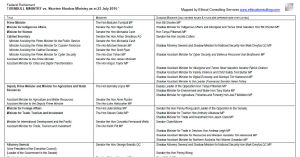 The new Australian Federal Ministry has been announced, and the Shadow Ministry as well, in the last few days, in consequence of the Australian Federal Election held on 2 July 2016.
The new Australian Federal Ministry has been announced, and the Shadow Ministry as well, in the last few days, in consequence of the Australian Federal Election held on 2 July 2016.
Ethical Consulting has done the hard work of matching up Government office-bearers against their Opposition counterparts, for you to download, here http://bit.ly/2a24t07.
If you prefer, here’s the Ministry http://bit.ly/2ai9Skv and here’s the Shadow Ministry http://bit.ly/2aDI894 for you to download, also.
.
Last Week in Queensland – 25 July 2016
 This week in Queensland we saw who’s in the new Federal Ministry and Shadow Ministry; we heard about State Parliament’s Estimates Committee hearings, and the Government made each Minister a “champion” for a major indigenous community.
This week in Queensland we saw who’s in the new Federal Ministry and Shadow Ministry; we heard about State Parliament’s Estimates Committee hearings, and the Government made each Minister a “champion” for a major indigenous community.
Federal Government
- In consequence of the recent Australian Election, the new Federal Ministry has been announced, and the Shadow Ministry. We’ve done the hard work of matching up Government office-bearers against their Opposition counterparts, for you to download, here http://bit.ly/2a24t07.
- If you prefer, here’s the Ministry http://bit.ly/2ai9Skv and here’s the Shadow Ministry http://bit.ly/2aDI894 for you to download, also.
Governing
- Marginalised Member of Parliament Jo-ann Miller pursues her own Government in Estimates hearings www.couriermail.com.au/news/queensland/queensland-government/queensland-parliament-estimates-hearings/news-story/6f77267c30fdbaf62a90f21fe07107ed
- … and the Government must grin and bear it www.couriermail.com.au/news/opinion/opinion-thems-fightin-words-marshall-miller/news-story/2cc20f8fb2a2783a4f73d5a3604f7234
- Queensland Government the first customer for PwC’s open innovation platform www.afr.com/leadership/pwcs-open-innovation-platform-gets-queensland-government-as-first-customer-20160720-gq9q9h
- Are Queensland fish catch quotas based on unreliable data? www.theguardian.com/environment/2016/jul/21/queensland-letting-commercial-fisheries-to-catch-endangered-sharks-says-reviewer
- Government counterattacks over criticism of increased staff numbers www.brisbanetimes.com.au/queensland/queensland-public-service-grows-by-4058-fulltime-workers-20160719-gq9d5g.html
- Will Commonwealth Games venues be ready? www.couriermail.com.au/news/queensland/fears-gold-coast-commonwealth-games-venues-may-not-be-ready/news-story/328ae09cd4fd81db589c8bbb03a9c2bd
- Queensland political donations to be reported in real time www.frasercoastchronicle.com.au/news/qld-get-real-time-donations-disclosure-system/3063928/
- Lawyers warn Government against a bill of rights www.theaustralian.com.au/news/nation/top-lawyers-warn-state-rights-act-a-lawyers-picnic/news-story/043ac733724e431d234bd40b7af84d9f
- Government promises replacement for Barrett Centre youth facility www.couriermail.com.au/news/queensland/palaszczuk-governments-help-plan-for-youth/news-story/717c1257aa6d6cf2ca0070d9ee5a3e85
- Container recycling scheme from 2018 www.brisbanetimes.com.au/queensland/queenslanders-recycling-cans-and-containers-will-get-10-cents-back-from-2018-20160722-gqbccy.html
- Massive loss on Mary Valley property sale www.couriermail.com.au/realestate/news/brisbane-qld/traveston-dam-queensland-government-cops-multimillion-dollar-loss-in-sale-of-mary-valley-property/news-story/e0fb790f08e49aa98a148bb02be761c5

- Amalgamated power entities required to reduce costs www.couriermail.com.au/news/queensland/palaszczuk-governments-power-provider-energy-queensland-forced-to-slash-costs-by-600-million/news-story/7e7c46cbe467cb9c97d0b59a3c344691
- Independent review of Electoral Commission coming http://statements.qld.gov.au/Statement/2016/7/21/independent-review-for-electoral-commission-of-queensland
The Opposition and Crossbench
- Estimates hearings reveal:
- Liberal National Party claims Cross River Rail has no trains www.couriermail.com.au/news/queensland/queensland-government/queensland-parliament-estimates-hearing/news-story/90d96173140222cc15ec1212239bdd77
- Government evades their own merit-based appointment system www.brisbanetimes.com.au/queensland/government-cops-flak-for-hiring-board-chair-outside-of-meritbased-process-20160721-gqanh7.html
- Government accused of considering new taxes www.sbs.com.au/news/article/2016/07/20/qld-opposition-has-new-tax-tunnel-vision
- Two thirds of child safety investigations start late www.brisbanetimes.com.au/queensland/two-thirds-of-queensland-child-safety-probes-start-late-20160720-gqab6z.html
- Sugar re-regulation – by Opposition and crossbench – criticised as economically inefficient www.afr.com/news/policy/queensland-sugar-reregulation-costs-outweigh-benefits-says-pc-20160720-gq9y80
- Opposition says theatre exchanged for poker machines www.brisbanetimes.com.au/queensland/queens-wharf-theatre-exchanged-for-pokies-opposition-20160718-gq87on.html
- Former Minister was badly advised, and no-one took responsibility says inquiry www.abc.net.au/news/2016-07-18/barrett-centre-closure-report-handed-down/7623032
- Queensland opposition names Government Member of Parliament as their “most valued player” http://au.news.yahoo.com/qld/a/32127697/labors-miller-named-mvp-by-qld-opposition/
Politics
- Bundamba Member of Parliament says she will be re-endorsed by Labor www.9news.com.au/national/2016/07/21/09/14/qld-mp-in-no-doubt-of-re-endorsement
- Toowoomba South by-election fallout www.brisbanetimes.com.au/queensland/queensland-election-toowoomba-south-a-kick-in-pants-says-government-20160718-gq7zrg.html
Community
- Bikie gangs regrouping and reforming on the Gold Coast www.theaustralian.com.au/news/nation/queenslands-ccc-takes-a-fresh-look-at-bikie-gangs/news-story/7cc4c81ad7d5351a5c77aa5f408c8508
- State targets slogans on Wicked vans www.9news.com.au/national/2016/07/21/12/20/wicked-vans-new-laws-could-force-cars-with-vulgar-slogans-off-queensland-roads
- New liquor laws reducing turnover, staff hours www.theguardian.com/australia-news/2016/jul/19/fortitude-valley-counts-cost-of-queensland-lockout-laws
- State Ministers to act as “champion” for one indigenous community each www.cairnspost.com.au/news/cairns/government-champions-program-to-promote-qld-indigenous-affairs/news-story/b07e21558a0ac0077885a9568a0cb380
- Government rejects funding mobile cardiology clinic www.abc.net.au/news/2016-07-18/heart-of-australia-qld-government-rejects-funding-proposal/7634974
- New liquor laws pressing patrons to binge drink? www.goldcoastbulletin.com.au/news/crime-court/surfers-revellers-skolling-drinks-and-bingeing-on-shots-in-attempts-to-beat-the-new-liquor-laws/news-story/f30050863416f70a571faef78f6e6425
- Farm Debt mediation to be legislated http://statements.qld.gov.au/Statement/2016/7/24/palaszczuk-government-to-introduce-legislation-to-establish-farm-debt-mediation
- South-East Queensland water grid to be extended to Moreton Bay http://statements.qld.gov.au/Statement/2016/7/20/100000-more-moreton-bay-residents-to-connect-to-the-seq-water-grid-for-first-time
Economy and Infrastructure
- Deloitte analysis talks up Queensland economy www.couriermail.com.au/news/queensland/queensland-economy-in-solid-state-say-deloitte/news-story/6c62714b9e0089e55ff65a847c8e4a75
- State Government releases Queensland’s first exploration forward plan www.northweststar.com.au/story/4042231/queensland-government-releases-plan/
- US technology startup lured to Queensland www.startupsmart.com.au/advice/funding/fast-growing-us-startup-timelooper-lured-to-queensland-thanks-to-state-government-program/
- Doubled payroll tax rebate for hiring apprentices and trainees www.smartcompany.com.au/finance/tax/72103-qld-government-doubles-payroll-tax-rebate-for-businesses-hiring-apprentices-and-trainees/
- Premier trying to lure Netflix to Queensland http://info-europa.com/uncategorized/palaszczuk-wants-to-lure-netflix-productions-to-queensland/19193
- Queensland to host Rugby League World Cup final www.smh.com.au/rugby-league/lack-of-funding-ensured-sydney-lost-the-rights-to-a-rugby-league-world-cup-final-20160719-gq8vah.html
- All racing infrastructure projects under review www.abc.net.au/news/2016-07-22/logan-greyhound-track-put-on-hold/7652614
- Input sought on fisheries management http://statements.qld.gov.au/Statement/2016/7/21/have-your-say-on-fisheries-reform-in-queensland
- Council infrastructure charges to be indexed http://statements.qld.gov.au/Statement/2016/7/20/better-support-for-councils-to-deliver-essential-infrastructure
Parliament
- Queensland’s Parliament is busy but not formally sitting: we’ve had Estimates hearings on the State Budget this week, and again from 26 to 28 July: the schedule for hearings is here: www.parliament.qld.gov.au/work-of-committees/Estimates
- The Queensland Parliament’s summary of what’s new, including newly-introduced and passed legislation, is here www.parliament.qld.gov.au/work-of-assembly/whats-new
- The Federal Parliament was prorogued for the Federal Election held on 2 July, and the first sittings days for the new Parliament are Tuesday 30 August to Thursday 1 September – see www.aph.gov.au
Sleeper Issues?
- Investigation launched into political fundraising on Gold Coast www.abc.net.au/news/2016-07-20/gold-council-regional-council-investigation-fadden-forrum/7643446
* We’re not representing that this is a complete coverage of news in Queensland – it certainly isn’t, and it’s what we find interesting or important, and sometimes what’s unusual. Some of the links will require subscriptions to read content.








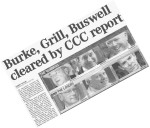 The Basics
The Basics